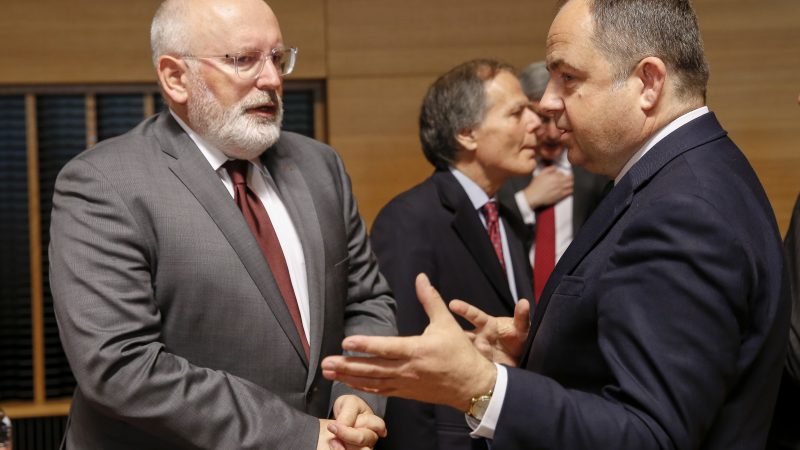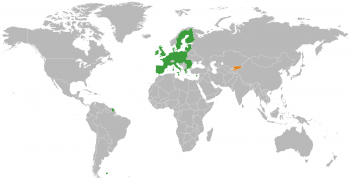
EurActiv (27 June 2018)
EU ministers held the first-ever Article 7 hearing in Luxembourg on Tuesday (June 26) to determine the state of play in the rule of law dispute between Brussels and Poland. The EU remains unconvinced by Poland’s recent efforts, with everyone waiting to see if and how a crucial judicial reform will go ahead on 3 July.
Expectations were high before the hearing: The conflict between Poland’s conservative government and Brussels has reached a deadlock in recent months, where both sides obstinately stuck to their own reasoning.
The Commission launched the Article 7 procedure against Warsaw last December after concluding that the Polish judiciary reforms pose a systematic threat to the country’s rule of law.
Earlier on Tuesday, Polish Prime Minister Mateusz Morawiecki told a news conference that despite “good will and readiness for compromise” from the Polish side, by making amendments to its judicial laws and presenting a revamped reform approach to the Commission, the latter did not close the Article 7 procedure.
“Our partners do not understand what the post-communist reality looks like. The justice system had a problem with self-cleansing,” he said in defence of the new laws and pointed to the fact that the reforms are needed to democratise a judicial system that has never been properly dealt with after the fall of communism.
Timmermans on Poland: Changes are ‘not sufficient’
Polish authorities need to address key concerns of the Commission over the independence of the country’s judiciary by the end of the month, Commission Vice-President Frans Timmermans told the European Parliament plenary in Strasbourg on Wednesday (13 June).
Deputy Foreign Minister Konrad Szymanski briefed his counterparts on the reforms in an address that lasted more than an hour.
“We’ll present the true state of judicial reforms and show that they’re compatible with European standards. Rule of law is implemented in the union in various ways, the member states have different constitutional traditions and Poland is located in this constitutional pluralism of the European Union,” he told journalists in Luxembourg ahead of the hearing.
However, Commission Vice-President Frans Timmermans pointed at the lack of willingness: “Let me be very clear, the systemic threat to the rule of law persists and for us to be able to say that it no longer persists, we will need some more steps from the Polish side,” Timmermans said. “We have not had any indications of that today. But who knows? There might be indications in the near future and we remain open for that dialogue.”
France and Germany presented a united stance during the session with France’s European Affairs Minister Nathalie Loiseau taking the floor for both Paris and Berlin. Their views were firmly backed by Benelux and the northern member states.
The communique after the Council meeting, however, was rather brief: ”The hearing offered a possibility for ministers to have an in-depth exchange with Poland on the concerns identified in the Commission’s reasoned proposal.” It is now on the Polish side, just like the times before, to address the concerns.
Signs point to de-escalation – for the moment
As the Bulgarian Presidency passes on its responsibilities on July 1 to Austria, which will have to take further steps. However, especially Chancellor Sebastian Kurz, who recently at a joint meeting with the Visegrad Group announced that he wants to act as a “bridge builder” between Brussels and the Eastern European capitals.
With the European Council agenda bursting at the seams, Poland will be not a formal point of discussion. With migration, euro reform, security and Brexit, none of the leaders will be ready to risk a rift with Poland at the table, which together with its three fellow Visegrad colleagues might block any decision. Especially, because Poland has a veto over the final draft of the EU’s long-term budget.
Asked what the next steps to come are, a Polish diplomat admitted Warsaw is bracing itself for a “storm after the calm” which might occur when 3 new reforms take effect on 3 July. As part of the judiciary overhaul, a new Supreme Court law enters into force and could lead to forced resignation of nearly 40% of its current judges due to age, while those wishing to stay could apply for permission to the Polish president.
However, the official made clear that the Polish government does not expect any further actions before the summer break.
The government’s strategy has served it well so far as no matter how obvious its bad faith, the Commission has continued to believe in the virtue of an ongoing dialogue, going as far as to abstain, for instance, from bringing the case before the ECJ in order to prevent the forthcoming purge of the Supreme Court early next month,” Laurent Pech, a professor of European law at Middlesex University in London, told EURACTIV.
He said Poland will be “continuing a similar strategy with its peers in the Council, which I believe is, however, riskier as other national governments may take it less kindly.”
“The longer the Article 7 process is maintained the longer the Polish government can be kept under pressure. Keeping the Article 7 process live also means more time for the ECJ to step in,” Pech believes.
No comments yet.
- BULGARIA TO BUILD NEW LINK TO TURKEY IN HOPE OF RUSSIAN GAS The Balkans 27.06.2018
- IRAQI PM SAYS ARMED GROUPS IN IRAQ SHOULD BE DISARMED, INCLUDING PKK Iraq 27.06.2018
- NATO'S JENS STOLTENBERG: 'WE DON'T WANT A NEW COLD WAR' WITH RUSSIA Europe - EU 27.06.2018
- IRAQI OIL MINISTER EXPRESSES INTENTION TO VISIT AZERBAIJAN The Caucasus and Turkish-Armenian Relations 27.06.2018
-
 EU AND KYRGYZSTAN DISCUSS COOPERATION ON HUMAN RIGHTS
Asia - Pacific
27.06.2018
EU AND KYRGYZSTAN DISCUSS COOPERATION ON HUMAN RIGHTS
Asia - Pacific
27.06.2018
-
25.01.2016
THE ARMENIAN QUESTION - BASIC KNOWLEDGE AND DOCUMENTATION -
12.06.2024
THE TRUTH WILL OUT -
27.03.2023
RADİKAL ERMENİ UNSURLARCA GERÇEKLEŞTİRİLEN MEZALİMLER VE VANDALİZM -
17.03.2023
PATRIOTISM PERVERTED -
23.02.2023
MEN ARE LIKE THAT -
03.02.2023
BAKÜ-TİFLİS-CEYHAN BORU HATTININ YAŞANAN TARİHİ -
16.12.2022
INTERNATIONAL SCHOLARS ON THE EVENTS OF 1915 -
07.12.2022
FAKE PHOTOS AND THE ARMENIAN PROPAGANDA -
07.12.2022
ERMENİ PROPAGANDASI VE SAHTE RESİMLER -
01.01.2022
A Letter From Japan - Strategically Mum: The Silence of the Armenians -
01.01.2022
Japonya'dan Bir Mektup - Stratejik Suskunluk: Ermenilerin Sessizliği -
03.06.2020
Anastas Mikoyan: Confessions of an Armenian Bolshevik -
08.04.2020
Sovyet Sonrası Ukrayna’da Devlet, Toplum ve Siyaset - Değişen Dinamikler, Dönüşen Kimlikler -
12.06.2018
Ermeni Sorunuyla İlgili İngiliz Belgeleri (1912-1923) - British Documents on Armenian Question (1912-1923) -
02.12.2016
Turkish-Russian Academics: A Historical Study on the Caucasus -
01.07.2016
Gürcistan'daki Müslüman Topluluklar: Azınlık Hakları, Kimlik, Siyaset -
10.03.2016
Armenian Diaspora: Diaspora, State and the Imagination of the Republic of Armenia -
24.01.2016
ERMENİ SORUNU - TEMEL BİLGİ VE BELGELER (2. BASKI)
-
AVİM Conference Hall 24.01.2023
CONFERENCE TITLED “HUNGARY’S PERSPECTIVES ON THE TURKIC WORLD"









